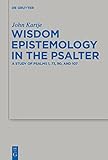Wisdom Epistemology in the Psalter : A Study of Psalms 1, 73, 90, and 107 / John Kartje.
Material type: TextSeries: Beihefte zur Zeitschrift für die alttestamentliche Wissenschaft ; 472Publisher: Berlin ; Boston : De Gruyter, [2014]Copyright date: ©2014Description: 1 online resource (216 p.)Content type:
TextSeries: Beihefte zur Zeitschrift für die alttestamentliche Wissenschaft ; 472Publisher: Berlin ; Boston : De Gruyter, [2014]Copyright date: ©2014Description: 1 online resource (216 p.)Content type: - 9783110350531
- 9783110383454
- 9783110352962
- 223.206 22
- online - DeGruyter
- Issued also in print.
| Item type | Current library | Call number | URL | Status | Notes | Barcode | |
|---|---|---|---|---|---|---|---|
 eBook
eBook
|
Biblioteca "Angelicum" Pont. Univ. S.Tommaso d'Aquino Nuvola online | online - DeGruyter (Browse shelf(Opens below)) | Online access | Not for loan (Accesso limitato) | Accesso per gli utenti autorizzati / Access for authorized users | (dgr)9783110352962 |
Browsing Biblioteca "Angelicum" Pont. Univ. S.Tommaso d'Aquino shelves, Shelving location: Nuvola online Close shelf browser (Hides shelf browser)

|

|

|

|

|

|

|
||
| online - DeGruyter Jüdische Klagen gegen Reichsadelige : Prozesse am Reichshofrat in den Herrschaftsjahren Rudolfs II. und Franz Stephans / | online - DeGruyter The Question of the Beginning and the Ending of the So-Called History of David’s Rise : A Methodological Reflection and Its Implications / | online - DeGruyter Elischa : Eine redaktions- und religionsgeschichtliche Studie / | online - DeGruyter Wisdom Epistemology in the Psalter : A Study of Psalms 1, 73, 90, and 107 / | online - DeGruyter Controlling / | online - DeGruyter Informationsmanagement : Grundlagen, Aufgaben, Methoden / | online - DeGruyter Instrumente des strategischen Managements : Grundlagen und Anwendung / |
Frontmatter -- Acknowledgements -- Contents -- Abbreviations -- Introduction -- Chapter I. Basic Issues in Epistemology and the Sociology of Knowledge -- Chapter II. Social Epistemology Case Study: Proverbs 1–9 -- Chapter III. Wisdom Elements Within the Psalms: Prior Studies and Present Focus -- Chapter IV. Psalm 1: Social Epistemology Within a Deuteronomistic Worldview -- Chapter V. Psalm 73: Mystical Knowledge -- Chapter VI. Psalm 90: Seeking for Knowledge -- Chapter VII. Psalm 107: The Epistemology of Salvation -- Conclusion: Implications for the Canonical Study of the Psalter -- Bibliography -- Bible Reference Index -- Author Name Index -- Subject Index
restricted access online access with authorization star
http://purl.org/coar/access_right/c_16ec
We present a comparative epistemological analysis of the wisdom motifs in Psalms 1, 73, 90, and 107. These texts were selected on the basis of their epistemological content (each confronts the relationship between virtue and prosperity), and their canonical placement within the Psalter (each begins one of the Psalter’s five “Books”). We explore the implications of their respective epistemological features for our understanding of the canonical structure of the Psalter.After developing a diagnostic method for the identification and analysis of the epistemological features within a biblical text, we apply it to each of the four psalms, and discuss their epistemological qualities with respect to their canonical placement in the Psalter.We find that an epistemic progression develops across the canonical ordering of the four psalms. While the psalmists are increasingly forthright in acknowledging the moral paradox that the righteous often suffer, while the wicked can prosper, they engage this paradox with ever more sophisticated responses. Although Yhwh is ultimately the source of all wisdom, human beings can facilitate their acquisition of knowledge by seeking him out intentionally, by questioning him directly, and by observing him with a heart focused on learning.
Issued also in print.
Mode of access: Internet via World Wide Web.
In English.
Description based on online resource; title from PDF title page (publisher's Web site, viewed 28. Feb 2023)


